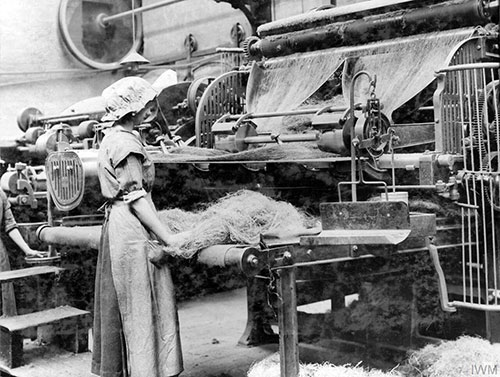Enemy of the Industrial Era
With the industrial revolution, Cannabis lost ground. Its hard fiber did not lend itself to being tamed by steam-powered cotton mills. Motorized boats dispensed with ropes and sails. And then came oil — and synthetic substances replaced biomaterials and bio-remedies. To top it off, psychoactive Cannabis was banned in every country in the world, complicating and bureaucratizing the production of the plant.
Worker “carding" Hemp in a British factory during World War I. Carding is a mechanical process that untangles, cleans, and mixes fibers to produce a web or ribbon of fibers suitable for the next steps in the textile process.
A series of developments affected the relationship between humans and Cannabis from the beginning of the 19th century. The invention of steam machines that automated the processing of cotton fiber and its weaving had a revolutionary effect on the world, with a huge expansion in textile production. Hemp, too hard to be processed and braided by machines, quickly lost market share. At the same time, the sudden spread of ships with steam engines had a devastating effect on the rope and sail industries.
But the industry that really profoundly changed the history of humanity and its relationship with plants was oil. Emerging in the mid-19th century, it expanded greatly in the early 20th century, when it was discovered that oil could be used to make almost everything.
The first synthetic fibers, made from oil polymers, date from this time. Synthetic substances, developed in laboratories from molecules extracted from oil, also transformed the medicine industry, which until then depended almost entirely on plant extracts.
Throughout the 20th century, as the industrialization of the world accelerated, humanity moved away from natural materials and active principles and radically altered its way of life. We are now feeling the effects of this immense transformation on the environment, our communities, and our bodies with climate change.
In the 1930s, various social sectors in the United States began to organize to make Cannabis production difficult. The target was primarily the psychoactive plant, marijuana, but the restrictions extended to Hemp — there are indications that this was partly due to the influence of the American petrochemical industry, interested in expanding the market for synthetic fibers.
In the decades that followed, this prohibition spread throughout the world, in many countries involving a project to eradicate cannabis and imprison everyone who works with it. This is what has come to be called the "war on drugs," a policy put into practice in the 1970s and that reached its peak in the 1990s, when the vast majority of Cannabis uses were forbidden worldwide.
The main consequence of this policy was the explosion in the incarceration of small-scale dealers. This growth in the prison population has been feeding criminal factions born inside prisons. This not only increases crime on the streets. Criminal organizations today manage to extend their power into the state, enticing public servants in the police, parliaments, and even courts.
Committed to defending policies for the resocialization of people imprisoned and released from the prison system in Brazil, the Humanitas360 Institute seeks to promote a frank and open discussion about drug policy in the country and its consequences, in addition to engaging in the debate regarding the medicinal and industrial uses of Cannabis.
